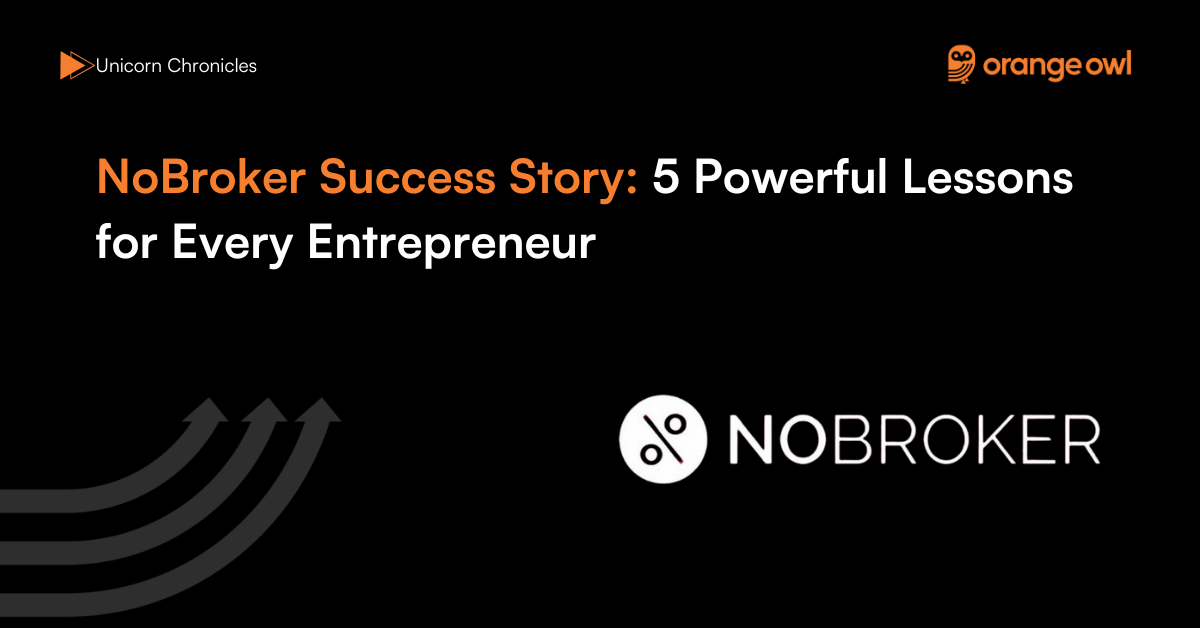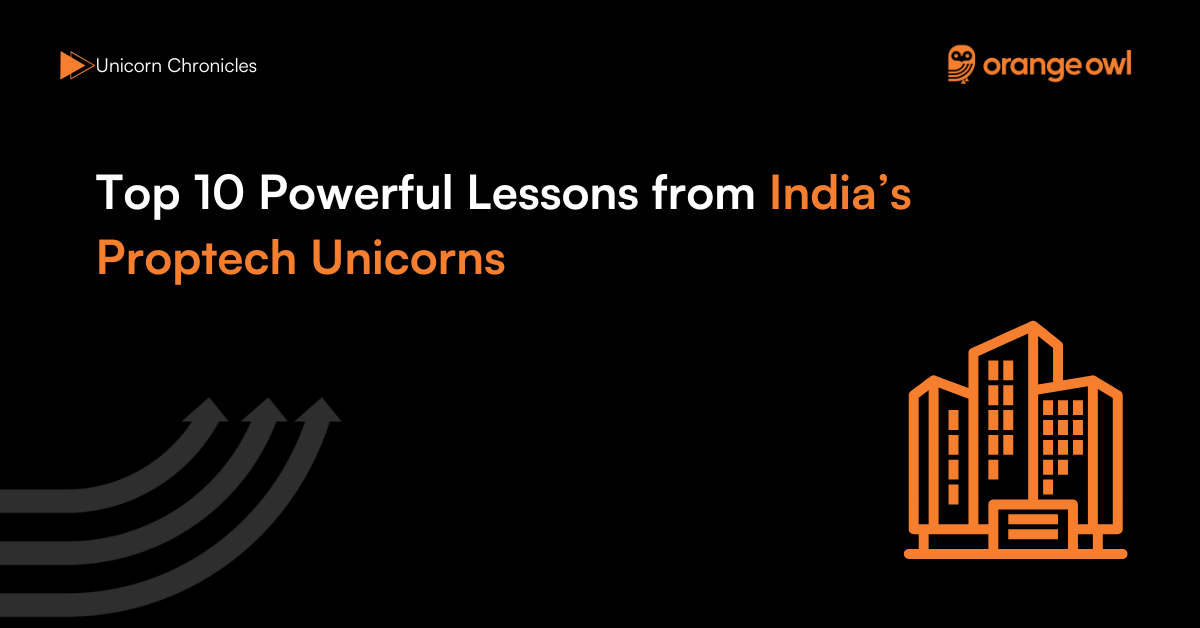NoBroker Success Story: 5 Powerful Lessons for Every Entrepreneur
Vivek Goel
June 11, 2025

Table of Contents
Introduction
In India’s massive and often chaotic real estate market, NoBroker has emerged as a bold disruptor, reshaping how people buy, sell, and rent properties by eliminating the traditional middleman: the broker. Founded in 2013 by Akhil Gupta, Saurabh Garg, and Amit Agarwal, NoBroker set out to solve a frustratingly common problem: high brokerage fees with little added value. Their solution? A tech-first real estate platform that directly connects property owners with tenants and buyers, creating a seamless, cost-effective, and transparent experience.
Fast forward to today, the NoBroker success story stands out as one of India’s most compelling proptech journeys. Having raised $368 million in funding from marquee investors like General Atlantic, Tiger Global Management, and Elevation Capital, the company now boasts a valuation of approximately $913 million. It has firmly established itself as a leader in the residential and commercial real estate tech segments, serving millions through its integrated digital ecosystem.
Operating across B2C real estate and construction tech markets, NoBroker offers a comprehensive suite of services—online property listings, rental and property management, digital rent payments, and even rent receipt generation. With a mission to make property transactions truly broker-free, the platform has turned a painful offline experience into a streamlined digital journey.
Yet, the NoBroker success story wasn’t without its hurdles. Competing with over 2,265 active players globally—including well-funded giants like Zillow, Redfin, and Trulia—NoBroker had to scale through deep innovation and sustained consumer trust. Today, it’s not just a proptech company—NoBroker is a movement proving how technology can disrupt deeply entrenched legacy systems and empower the everyday Indian.
Origin Story
NoBroker was born in 2013 out of a deeply personal frustration shared by its founders—Akhil Gupta, Saurabh Garg, and Amit Kumar Agarwal. All three had experienced firsthand the inefficiencies, high costs, and lack of transparency that plagued India’s property rental and purchase market. The biggest culprit? Middlemen—brokers who charged hefty commissions while adding little value to the actual transaction.
“There had to be a better way,” the founders thought.
In a world where technology was simplifying commerce, travel, and finance, why was real estate still stuck in a cycle of offline listings, inflated costs, and broker dependency?
With backgrounds in engineering and management (including stints at IIT, IIM, and global companies like PwC and Oracle), the trio decided to tackle the problem head-on. Their idea was bold but simple: build a tech platform that eliminates brokers and puts the power back into the hands of buyers, sellers, tenants, and landlords.
In 2013, they launched NoBroker—a name that made their mission crystal clear. The company started by offering direct listings of rental properties, allowing tenants and landlords to connect without a middleman. What began as a scrappy, no-frills platform quickly gained traction among urban millennials tired of paying brokerage fees for minimal service.
As the platform scaled, so did the vision. From simple listings, NoBroker expanded into property management, rental agreements, rent payments, and even home services—building a complete digital ecosystem around real estate transactions.
What truly set them apart was their commitment to solving a real, everyday problem with technology-first thinking, reminiscent of how UPI changed payments or how Ola changed transport. NoBroker wasn’t just about disintermediation—it was about empowerment, transparency, and efficiency in one of India’s most complex sectors.
Business Space and Early Challenges
NoBroker stepped into one of the most opaque, fragmented, and broker-driven sectors in India—residential and commercial real estate. Whether someone was trying to rent a home, buy a flat, or lease out a property, they were almost always forced to go through middlemen who added hefty brokerage costs, yet delivered minimal value. In many cases, these brokers operated informally, lacked proper verification processes, and often led to a frustrating and inefficient experience for both property seekers and owners.
“Everything about property transactions in India felt broken—from discovery to paperwork,” recalled co-founder Amit Kumar Agarwal. “You paid huge brokerage fees but got no real value in return.”
It was this widespread inefficiency that sparked the idea for NoBroker. The founders—Amit Kumar Agarwal, Akhil Gupta, and Saurabh Garg—wanted to build a platform that would eliminate the need for brokers entirely and instead enable direct interactions between property owners and seekers. It was a revolutionary concept in a space that had barely seen any true digital transformation.
However, going broker-free wasn’t just bold—it was risky.
“Our biggest hurdle wasn’t just building the tech—it was changing deep-seated user behaviour,” said co-founder Akhil Gupta. “People had become so used to relying on brokers that they were unsure if a tech platform could really work for something as high-stakes as finding a home.”
The challenges didn’t stop there. Brokers themselves saw NoBroker as a threat, and in some cities, the company even faced protests and backlash from local broker associations. On the user side, the lack of trust in purely digital interactions posed another major obstacle, especially when it came to verifying listings, finalising agreements, and handling payments.
To overcome these early challenges, NoBroker doubled down on building trust. The team invested in:
- Verified listings to weed out fake or duplicate entries
- Secure payment gateways for deposits and rent
- Digital rental agreements to simplify legal formalities
- Customer support and premium relationship managers to handhold users throughout the journey
Another massive complexity was the hyperlocal nature of Indian real estate. Property pricing, legal nuances, and rental dynamics differed not just from state to state, but neighbourhood to neighbourhood. Scaling a tech product that worked across Mumbai, Bengaluru, Pune, Chennai, and Delhi NCR required intense data mapping, localisation, and operational customisation.
Despite these hurdles, the NoBroker team remained laser-focused on its mission: to make real estate transactions transparent, affordable, and hassle-free through technology. By solving tangible pain points and relentlessly improving their product, they gradually earned the trust of millions and built one of India’s most disruptive proptech platforms, completely bypassing the traditional brokerage model.
Growth Strategies
NoBroker’s growth trajectory in the Indian proptech space has been driven by a clear vision, strong technology backbone, and a relentless focus on customer-centric innovation. From the outset, the founders were not just building a listing platform—they were creating a full-stack real estate ecosystem designed to eliminate inefficiencies, reduce transaction costs, and empower users to transact without brokers.
One of NoBroker’s most transformational growth decisions was the introduction of NoBroker Pay, a feature that allowed tenants to pay rent directly through the platform. This not only helped drive recurring usage but also created a sticky financial product around an already high-frequency behaviour—rent payments. The company quickly expanded the feature set to include deposit payments, rent agreements, and even rent loans, turning NoBroker into a trusted financial facilitator in the housing journey.
Beyond that, NoBroker’s growth was supercharged by its strategic entry into home services, such as packers and movers, painting, cleaning, pest control, and home maintenance. This vertical integration allowed them to offer end-to-end solutions, deepened user engagement, and unlocked new revenue streams. These services also helped solve one of the platform’s biggest challenges: converting a one-time user into a repeat customer.
The company also leveraged AI and machine learning to enhance listing quality, match users with ideal properties, and flag fake or duplicate entries. This improved user trust and retention, a key differentiator in a market flooded with subpar aggregator platforms.
NoBroker was also aggressive about geographical expansion, launching operations across India’s top urban centres, including Mumbai, Bengaluru, Pune, Chennai, Hyderabad, and Delhi NCR. Each expansion was powered by hyperlocal playbooks, data analytics, and on-ground operations teams trained to handle the nuances of city-specific real estate dynamics.
Funding also played a pivotal role in scaling the company. NoBroker raised over $368 million from leading investors like General Atlantic, Tiger Global, and Elevation Capital, which helped strengthen its technology infrastructure, build out services, and expand market presence. The company also achieved a valuation of over ₹7,580 crore (~$914 million), cementing its position as one of India’s most valuable and differentiated proptech unicorns.
“Our focus has always been on solving real, daily problems around housing. It’s not about scale for vanity—it’s about relevance, frequency, and trust,” noted Amit Kumar Agarwal, CEO and co-founder.
By anchoring itself in customer needs, leveraging tech-enabled convenience, and maintaining a laser-sharp focus on disintermediation, NoBroker has successfully redefined how Indians rent, buy, and manage homes, without ever needing a broker.
Marketing Strategies
In a sector long dominated by middlemen and mistrust, NoBroker’s marketing strategy stood out for its focus on authenticity, clarity, and user empowerment. Instead of relying on aggressive ad spends, the startup focused on solving real problems and letting user experience drive brand loyalty.
At the heart of its messaging was the powerful and memorable slogan: “Say No to Brokerage.” This direct, problem-focused tagline resonated instantly with millions of Indians tired of paying hefty brokerage fees. It became more than a slogan—it became a rallying cry for change.
To amplify this message, NoBroker leaned heavily into content marketing. From blogs, FAQs, and legal explainers to YouTube videos and tutorials, they produced practical resources that helped users navigate the complex housing process. This content not only improved search visibility but also built trust.
“We wanted to be more than a platform—we aimed to be a long-term partner in our users’ housing journey,” said Saurabh Garg, co-founder of NoBroker.
The team also adopted a hyperlocal strategy, using city-specific ads, local language content, and regional influencers to connect with users more personally. Coupled with strong user testimonials and social proof, this approach helped overcome the market’s deep-rooted scepticism.
As NoBroker scaled, its founders began appearing in media interviews, conferences, and startup events, reinforcing the company’s narrative of transparency, disruption, and tech-first innovation.
Rather than chasing short-term attention, NoBroker’s marketing was about building long-term credibility—a strategy that aligned perfectly with its mission of making real estate simpler, fairer, and broker-free.
5 Powerful Lessons Every Entrepreneur
1. Build for a Real, Everyday Problem
NoBroker’s success didn’t come from riding a real estate tech trend. It came from solving a clear and persistent pain point—the dependence on brokers for buying, selling, or renting homes. In India, brokers were seen as a necessary evil: charging steep commissions for services users didn’t always need. NoBroker’s decision to eliminate brokers gave it an instantly relatable and differentiated market position.
“We asked ourselves—can we remove the broker entirely and let owners and tenants talk directly?” said Amit Kumar Agarwal, co-founder.
Entrepreneurs should remember—when you solve a problem deeply rooted in daily life, product adoption follows naturally.
2. Let Technology Replace the Middleman
Instead of digitising brokerage, NoBroker replaced it with smart automation—using AI algorithms to match tenants and owners, detect spam listings, and offer services like chat, document verification, and virtual tours. This gave users a self-service experience in a space that was traditionally agent-dependent.
Lesson: Don’t just digitise legacy workflows—reimagine them entirely with tech. If you can make users feel empowered, your product will scale faster.

3. Monetise Without Compromising Trust
NoBroker made a bold promise: no brokerage ever. And it stuck to it. Instead of monetising through commissions, it offered subscription-based plans and value-added services like legal help, home cleaning, movers & packers, and rent agreements.
This model helped the company earn revenue without eroding user trust, which is rare in the real estate category.
“We knew trust would be our currency. Everything else—scale, revenue, retention—flows from that,” said co-founder Akhil Gupta.
A valuable reminder for startups: your monetisation strategy must align with your brand promise.
4. Scale with Automation, Not Manpower
Most real estate startups scale by adding more agents or customer support staff. NoBroker scaled by building intelligent tech systems—fraud detection engines, listing quality filters, and automated customer support. This allowed the platform to expand across cities without diluting the user experience.
Lesson: Don’t confuse scaling with hiring. If your platform can scale through systems, not people, you’ll retain speed and quality as you grow.
5. Invest in Market Education
Changing user behaviour—especially in a space like real estate—isn’t easy. NoBroker spent significant effort on educating users: from blogs and YouTube explainers to WhatsApp support and in-app guidance. They didn’t just remove brokers—they replaced their value through thoughtful content and hand-holding.
“We weren’t just removing brokers. We were replacing them with information, transparency, and trust,” said co-founder Saurabh Garg.
Startups in legacy spaces must play the long game—educate before you sell, and users will reward you with loyalty.
Conclusion
NoBroker’s evolution from a bold idea to a unicorn startup is more than just a tech story—it’s a masterclass in problem-first entrepreneurship. In a cluttered real estate market plagued by inefficiency and mistrust, NoBroker chose a path few dared to take: eliminating the middleman. What followed was not just disruption, but systemic reinvention—powered by intelligent automation, user trust, and relentless focus on execution.
Whether it was scaling without brokers, monetising ethically, or educating the market from the ground up, NoBroker proved that deeply understanding user pain points is the ultimate growth hack.
For founders navigating legacy industries, this story offers a simple but powerful takeaway:
Solve hard problems honestly, and let tech amplify the impact.
As co-founder Amit Kumar Agarwal said, “We didn’t want to make brokers more efficient—we wanted to make them irrelevant.”
That conviction has already reshaped how millions of Indians find homes—and it’s laying the foundation for a broker-free, frictionless future in real estate.


